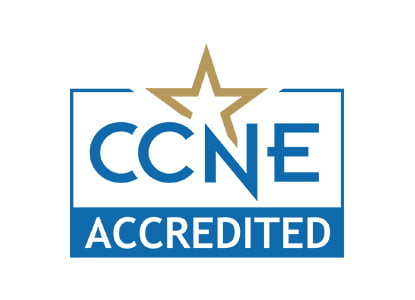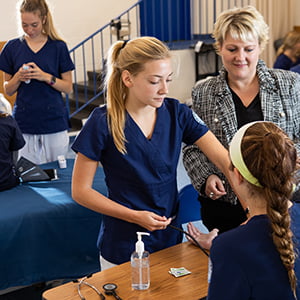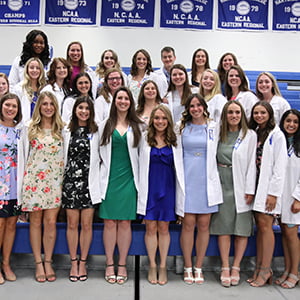School of Nursing Overview
Quick Links
Hartwick has over 80 years of experience preparing nurses at the baccalaureate level. Our NCLEX pass rate for May 2023 graduates was 100%. This is well above both the NYS and National averages.
The broad liberal arts and sciences education that complements Hartwick’s nursing program provides the communication, critical thinking, informed decision-making, and leadership skills the profession demands. Hartwick nurses are highly qualified, self-directed individuals who are able to thrive in both the present and a rapidly changing healthcare system of the future.
The School of Nursing offers a variety of programs to both high school graduates and transfer students. Whether you have a high school diploma, a bachelor’s degree or anything in between, we have a program for you.
School of Nursing’s Mission, Vision & Goals
Our mission is to educate individuals to become highly qualified, competent, self-directed nurses who will continually evolve in a constantly changing health care system. Our vision is to excel at integrating the liberal arts with a nursing education. The liberal arts educated nurse graduate will possess the personal, intellectual, and social skills necessary to meet the challenges of an increasingly interdependent and diverse world.
Nursing Licensure Reciprocity
New federal regulations effective July 1, 2020, require institutions offering programs leading to professional licensure or certification to provide notifications that indicate whether or not the program, regardless of modality (either online or face-to-face) meets educational requirements for licensure/certification in a given state.
Learn MoreBaccalaureate Graduate Outcomes
Graduates are able to intervene therapeutically; critically think, reason, and problem solve; communicate effectively; and act responsibly as citizens of the world and self-regulating members of the profession. Program outcomes reflect the standards for baccalaureate nursing education.
Acts responsibly as a self-regulating member of the profession demonstrates professionalism and professional values:
– Demonstrates positive self-care and ethical behaviors.
– Demonstrates personal and professional accountability, and responsibility.
– Engages in personal and professional self-development and life-long learning.
– Demonstrate national and global engagement through service commitments to local and broader community.
– Demonstrates knowledge of the political, economic, and regulatory context on health care policies, the health care system, and nursing care.
– Demonstrates professional values of caring, altruism, autonomy, integrity, and promotion of human dignity and social justice in all encounters.
Communicate effectively as a member of interprofessional health care team to promote safe, quality, effective care; and a healthy professional work:
– Uses Communication techniques (verbal, non-verbal, written, and therapeutic) effectively to assess, plan, implement, and evaluate care.
– Uses communication techniques to effectively gather and disseminate information.
– Effectively manages and uses information and healthcare technologies to provide safe, quality, effective care and care practices.
– Collaborates with the individual, family, and members of the inter-professional health care team to meet identified patient care needs.
– Effectively communicates patient needs and concerns (individuals, families, communities, aggregates) in a developmentally and culturally appropriate manner.
Intervenes therapeutically to provide to provide high quality, safe, and effective care-the graduate is able to perform holistic care such as but not limited to:
– Performs holistic nursing care (health promotion, risk reduction, disease prevention, illness and disease management that meets the unique needs of the patient.
– Applies knowledge and skill in leadership-management, quality improvement, and patient safety to provide high quality health care.
– Demonstrates knowledge of organizational behavior, the healthcare system, information and healthcare technologies, and human and global perspectives into care.
– Demonstrates knowledge of relevant agency, regulatory, and professional healthcare policies and standards into care.
– Integrates scholarship and current evidence into care.
The graduate is able to critically think, evaluate information, and applies clinical reasoning to patient care and clinical decision-making situations such as but not limited to:
– Uses scientific problem solving, coordination of care, health teaching and promotion, consultation and evaluation2 to provide, design, manage, and coordinate care for patients across the life span.
– Synthesizes theories and knowledge from nursing science with the physical and life sciences with physical and life sciences, humanities, social and behavioral health sciences into patient care and clinical decision-making.
– Applies knowledge of organizational behavior, the healthcare system, information and healthcare technologies, and human and global perspectives into patient care and clinical decision-making.
– Considers relevant agency, regulatory, and professional healthcare policies and standards into care planning and clinical decision-making.


